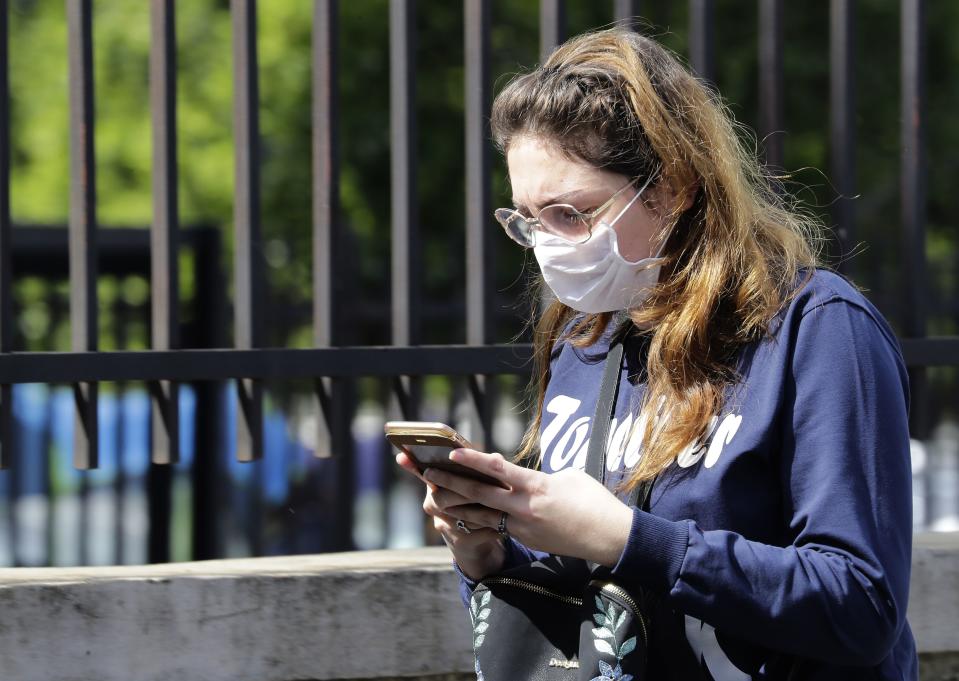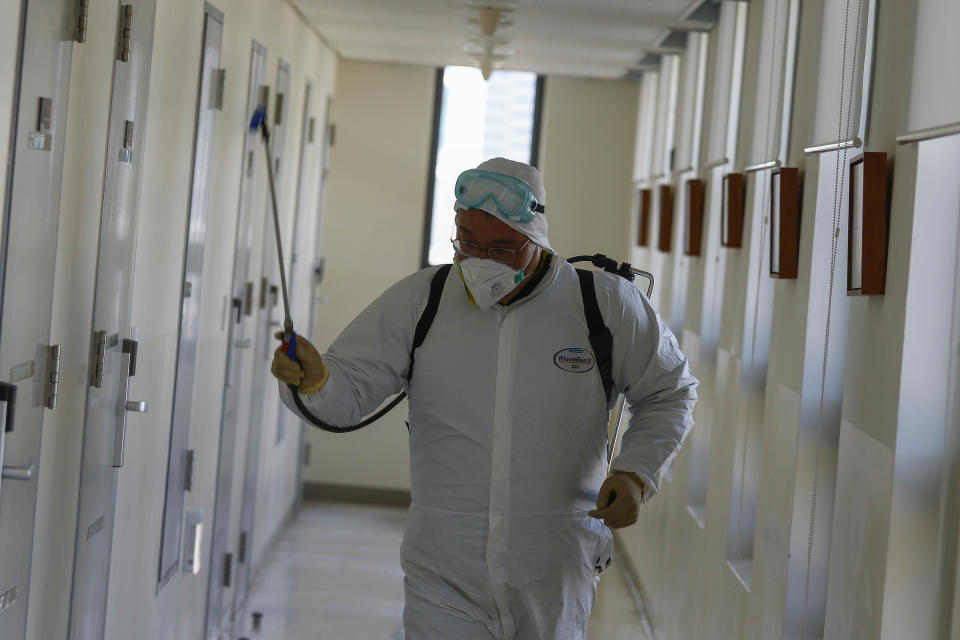Should humans limit their contact with animals to prevent further coronavirus outbreaks?

The coronavirus outbreak is sparking fear all over the world.
Virtually unheard of just two months ago, the new strain Covid-19 has more than 89,000 confirmed cases globally, according to John Hopkins University data.
Read more: How could anti-bacterial hand sanitisers protect against the coronavirus?
The bulk of the incidences – 80,026 – are in mainland China, where the infection arose at a seafood and live animal market in the city Wuhan.
Most of those who initially became unwell worked at, or visited the market, prompting the theory the infection “jumped” from an unknown animal into humans.
The Covid-19 outbreak is far from the only infection to start in another species, with everything from Ebola to swine flu jumping from beasts to man.

Since emerging at the end of last year, Covid-19 has been identified in more than 60 countries.
South Korea is second to China, with more than 4,300 confirmed cases and over 20 deaths.
This is followed by Italy, with over 1,600 patients and 34 fatalities.
The UK has 36 patients. A British man died from the infection on Friday after being aboard the “hotbed” Diamond Princess cruise ship.
Worldwide, the death toll has exceeded 3,000 as severe cases succumb to pneumonia.
While it may sound alarming, research suggests four out of five cases are mild, while over 45,000 people globally have recovered from the infection.
How do infections like coronavirus Covid-19 ‘jump’ from animals into humans?
Covid-19 is an “RNA virus”. In simple terms, RNA is a precursor to the more well-known DNA.
These viruses mutate almost constantly, raising the risk they will evolve the ability to infect a new species.
Covid-19 is said to have arisen at a now-shut “wet market” that was involved in the illegal trade of animals.
Wet markets tend to be made up of outdoors stalls in narrow lanes where live and dead animals “mingle”.
The Wuhan market reportedly sold everything from bats and poultry to hedgehogs and donkeys, making it all the more difficult to trace where Covid-19 began.
These animals are often slaughtered in front of the customer.
“That means there's a lot of skinning of dead animals in front of shoppers and, as a result, aerosolising of all sorts of things,” said Dr Emily Landon from the University of Chicago.
What other infections have arisen in animals?
Covid-19 brings back memories of fellow coronavirus severe acute respiratory syndrome (Sars), which killed 774 people during its 2004 outbreak. No cases have been reported since.
Coronaviruses are a class of pathogens, seven of which are known to infect humans.
Covid-19 is said to be more genetically similar to Sars than any other virus of that class.
The International Committee on Taxonomy of Viruses (ICTV) is even calling Covid-19 “severe acute respiratory syndrome coronavirus 2” (SARS-CoV-2).
Covid-19, Sars and fellow coronavirus Middle Eastern respiratory syndrome (Mers) are thought to have started in bats.
Sars likely jumped from bats to humans via the masked palm civet, which have been pictured at wet markets.
Civets are thought to become carriers of the coronavirus if they eat fruit a bat has defecated on.
More than a decade after Sars, officials in China have banned the buying, selling and transportation of wild animals in markets, restaurants and “online marketplaces”, Business Insider reported.
Read more: Could a patient become 'reinfected' with the coronavirus?
Yet, wet markets – a largely Chinese phenomenon – cannot be blamed for everything.
Mers, which killed 858 people during its 2012 outbreak, is thought to have somehow jumped from bats to camels in the “distant past”.
The Arabian dromedary camel carries the virus in its nostrils, prompting a handful of cases to arise every year in Saudi Arabia, where the animals are used for transport.
Covid-19 may have jumped from bats to pangolins, which are reportedly eaten in parts of China and used in traditional Chinese medicine.
Although not a coronavirus, Ebola - the only disease to be made a “global emergency” twice - has killed more than 12,000 people in western Africa.
Fruit bats are thought to be “natural Ebola hosts”, with the virus reaching humans through “close contact with the blood, secretions, organs or other bodily fluids of infected animals”.
These animals may include the bats themselves, as well as “chimpanzees, gorillas, monkeys, forest antelope or porcupines found ill or dead or in the rainforest”.
As its name suggests, swine flu – the first global emergency in 2009 – came from close contact with infected pigs.
Markets selling live birds, whether “wild” or poultry, can be responsible for bird flu.
Humans may become infected by touching, killing or preparing an infected dead or alive bird, as well as coming into contact with its droppings or bedding.
This is naming just a few, with everything from HIV to rabies likely arising in animals.

Should we be limiting our contact with animals to prevent another disease outbreak?
Probably, but how realistic that would be is another matter.
Speaking at the beginning of February, Professor David Heymann – from the London School of Hygiene and Tropical Medicine – said: “People are moving closer to animals.
“This will happen again, but may not be a coronavirus.
“Humans have always eaten animals, this [outbreak] ‘hit the runway’.”
Professor Kao Rowland – from the University of Edinburgh – agreed, telling Yahoo UK: “It’s well established new pathogens in humans often arise from animals.
“This isn’t surprising given there are many similarities between other mammals in particular and ourselves, and so relatively small changes could make a disease that can spread amongst humans.
“Given the number of different species of wildlife, it isn’t surprising they also harbour a large number of viruses.
“This is why wet markets are important – greater exposure to animals which might have an infection and the act of slaughtering them increases the chance some infection could be passed across to us.”
Read more: What could a coronavirus worst-case scenario really look like in the UK?
Another expert welcomed China’s decision to “ban” wet markets.
“This is yet another indication that we need to shut down these wildlife markets and try to prevent these spillover events,” Professor Devi Sridhar, also from the University of Edinburgh, told Yahoo UK.
With some questioning whether we should adopt a plant-based diet to ward off these infections, Professor Rowland pointed out animal markets tend to be regulated, reducing the risk of outbreaks.
“Here and in many other countries, the slaughter of livestock is strictly regulated,” he told Yahoo UK.
“There is always the possibility of accidents and violations, but on the whole our procedures help to keep us safe.
“There are lots of reasons to be very conscious of the amount of meat we eat, where we source them from, with considerations of animal health and welfare.
“However, under properly regulated conditions, the risk of these jumps resulting in new kinds of disease epidemics is low.”
Professor Nicola Stonehouse – from the University of Leeds – pointed out camels “spread” Mers as a result of their use for transportation, not food.
“We’ve always lived closely with animals,” she told Yahoo UK.
“[Avoiding animals] would need a massive change in behaviours.
“Camels are such an integral part of society in the Middle East.”
Professor Heymann agreed, adding: “Regulating animals is very difficult to enforce.”
What is the coronavirus Covid-19?
Covid-19 spreads via face-to-face contact when an infected person expels droplets while sneezing or coughing.
It triggers flu-like symptoms, such as fever, cough and breathlessness.
In severe cases, pneumonia can come about when the infection causes the alveoli (air sacs) in the lungs to become inflamed and filled with fluid or pus.
The lungs then struggle to draw in air, resulting in reduced oxygen in the bloodstream.
“Without treatment the end is inevitable,” said the charity Médecins Sans Frontières.
“Deaths occurs because of asphyxiation.”
To prevent infection, officials recommend regular hand-washing and “social distancing”.

 Yahoo Finance
Yahoo Finance 
